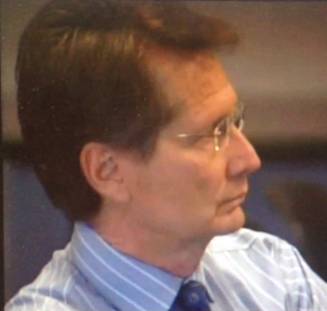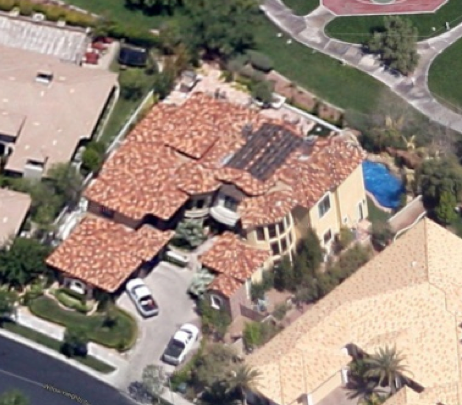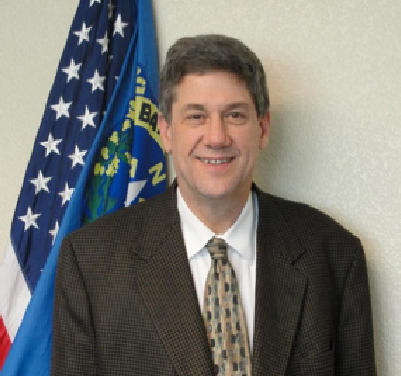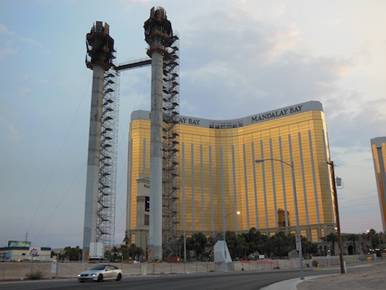Submitted by PRWatch Editors on
-- by Bob Sloan, Guest Contributor
"The taxpayers have been left holding the bag.... As a result of this I think there is going to be a lot more oversight."
 Those were statements made by Nevada Assemblyman James Ohrenschall in an interview on Vegas Inc. September 21. Mr. Ohrenschall is the former chairman of the Legislature's Interim Finance Committee on Industrial Programs. At the time of that interview, the IFC Committee was meeting to investigate facts that prompted his concerns.
Those were statements made by Nevada Assemblyman James Ohrenschall in an interview on Vegas Inc. September 21. Mr. Ohrenschall is the former chairman of the Legislature's Interim Finance Committee on Industrial Programs. At the time of that interview, the IFC Committee was meeting to investigate facts that prompted his concerns.
Ohrenschall was speaking of prison labor and Nevada prison industry's partnership with Alpine Steel, LLC, that has resulted in nearly half a million dollars of debt owed to the state and a legislative reform of the state's prison industry program.
When Vegas Inc. anchor Dana Gentry asked the Assemblyman if Nevada's Department of Corrections (NDOC) or prison industry officials were being held accountable in any way, he responded, "I believe that they will be held accountable..." The oversight authority for prison industries is the Legislature's Interim Finance Committee on Industrial Programs (IFC-IP). Critics had accused the committee of not providing sufficient oversight or vetting of NDOC contracts with private companies and not enforcing compliance with key statutory duties of the committee. The Committee served, more or less, to "rubber stamp" proposals brought before it by the NDOC without fully determining the impact a new proposed industry would have on Nevada workers and competing businesses.
The Nevada labor force is now represented by two members on the IFC: Robbie Conway of Ironworkers Local 433 and Mike Magnani of Teamsters Local 986. With their dedication to protecting the rights and jobs of Nevada's workers, it is likely that situations similar to the one involving Alpine will not reoccur.
After the investigation of Alpine Steel, members of the IFC appear to realize that prison labor competing for jobs needed by Nevada's unemployed is a serious issue that needs constant vigilance. Doubling the number of labor representatives on the committee overseeing prison industries is expected to improve oversight.
With the addition of Conway to the Committee and a new Chairman, the current IFC appears to be a genuine "oversight" body now. They asked key questions, probed for responsive answers and asked IFC member Cox and Deputy Director Connett to provide materials to them supporting answers they provided to the Committee at the initial meeting on the 20th.
Despite Huge Subsidies (and Prison Labor) Alpine Steel Incurs Big Debt
The sad saga of prisoners being used for their labor by private contractors in Nevada continues to amaze the citizens of this state.
 The story began late last year when steel companies began protesting to NDOC and legislative authorities saying they were being unfairly forced to compete against a local company using inmate labor. Business owners asserted they had lost bids on projects and thus were unable to expand their businesses or hire more workers due to interference from Nevada's prison industry operations.
The story began late last year when steel companies began protesting to NDOC and legislative authorities saying they were being unfairly forced to compete against a local company using inmate labor. Business owners asserted they had lost bids on projects and thus were unable to expand their businesses or hire more workers due to interference from Nevada's prison industry operations.
Claims were made that dozens of Las Vegas steel workers were being denied jobs and others possibly displaced due to the use of prisoners as a slave-labor force by Alpine Steel, LLC. The NDOC had given Alpine's owner, Randy Bulloch, a "sweetheart deal" consisting of inmate wage scale set at or below minimum wage (less than 1/2 of the current prevailing wage for Nevada's steel workers), manufacturing facility leases (set at 66% below the going rate for such space outside prison), and utility costs at NDOC's reduced rates.
Such state subsidies provided Alpine with a definite advantage over competitors when bids were sought for new projects in and around Las Vegas. Bids won by Alpine due to reduced overhead costs provided by the NDOC included: the "SkyVue Observation Wheel", the Wet 'n' Wild water theme park, bridge work on an overpass over I-15, and the expansion of a mental hospital, among dozens more since 2006.
As this story unfolded earlier this year, it was discovered that in spite of receiving the huge financial benefits mentioned above, Alpine was in arrears on payments for inmate wages, staff salaries, utility costs, leases, and workers compensation premiums. In essence, the evidence suggested that the bulk of Alpine's Las Vegas operation was being quietly financed by the NDOC with state tax dollars.
In addition, prison industry critics learned the IRS had recorded a lien of more than $600,000 dollars against the company; a tax lien had also been filed by the state DOR and several steel suppliers had placed liens against Alpine for failing to pay for materials. (These liens continue to pile up: last month, the IRS recorded a second tax lien upon the company for more than $30,000.)
The story became public through the media and in December 2012 -- under pressure from the Board of Prison Commissioners (BPC) and an order from Governor Sandoval -- NDOC Director Greg Cox closed down Alpine's steel fabrication operation at the High Desert State Prison complex. Members of the BPC and the IFC-IP called for some form of personal guarantee from Bulloch to ensure the taxpayers were not left on the hook for nearly half a million dollars owed by Alpine.
 In January, Connett and Bulloch reached an agreement on repaying the money Alpine owed to the state. Connett negotiated through Deputy Attorney General Carrie Parker on AG Catherine Cortez Masto's staff and got her to approve a proposed forbearance agreement setting the Alpine debt at $438,000+ with no interest, penalties or additional fines.
In January, Connett and Bulloch reached an agreement on repaying the money Alpine owed to the state. Connett negotiated through Deputy Attorney General Carrie Parker on AG Catherine Cortez Masto's staff and got her to approve a proposed forbearance agreement setting the Alpine debt at $438,000+ with no interest, penalties or additional fines.
Incredibly, the terms of the agreement failed to include any personal guarantee from Alpine's owner Bulloch -- who resides in a multi-million dollar, 9,400 square foot, guarded and gated estate -- while owing millions in state, federal and personal liens -- much of that owed to taxpayers.
Though many including the Interim Finance Committee and Secretary of State had demanded such a provision, the final document left any personal guarantee out of the agreement. If a default occurred, Randy Bulloch's personal property and other assets would be untouchable -- and the debt likely uncollectable. The substantial IRS lien precedes and takes precedence over the newly filed NDOC summary judgment, making it less likely the state will be able to recover any of the outstanding debt until the IRS lien is satisfied.
It is incomprehensible to most that in the face of more than a million dollars owed to the IRS, creditors and the state of Nevada, the NDOC would negotiate an agreement on additional debt owed by Alpine without seeking any form of personal guarantee from the company's owner. Similarly it defied belief that a member of the AG's staff failed to demand such a personal guarantee for the debt, knowing the repayment plan was being sought for a company that was already in deep financial trouble.
The Alpine contract is at the core of this problematic situation involving the use of state owned facilities and prisoner labor. The NDOC failed to take appropriate action to cure Alpine's continued default for more than three years. Incredibly, Connett issued a new contract to Alpine in 2011 while the company was in serious default -- without requiring the company to come current on its debt -- and the IFC-IP approved the contract without knowing of the default(s).
Allowing a contractor to operate for more than four years without making required payments and taking no steps to stop the bleeding of tax dollars before renewing a contract, demonstrates a total lack of responsibility to the state administration and the taxpayers.
Only after the story broke in the media was the Governor, the IFC members and the BPC made aware of the full amount owed due to nonpayment(s). With Attorney General Cortez-Masto sitting on the BPC, the absence of any personal guarantee from Bulloch in the forbearance agreement signed off on by her agency is puzzling.
The NDOC Defends Alpine and Dodges Questions about the Money Due
 The NDOC's Director Cox was contacted about details of this debt and any related negotiations. His office forwarded the query to NDOC Deputy Director Brian Connett, who is also the NDOC Public Information Officer. Connett is also the current chairman of the board of the "National Correctional Industries Association" (NCIA), which oversees the Prison Industry Enhancement Certification Program (PIECP).
The NDOC's Director Cox was contacted about details of this debt and any related negotiations. His office forwarded the query to NDOC Deputy Director Brian Connett, who is also the NDOC Public Information Officer. Connett is also the current chairman of the board of the "National Correctional Industries Association" (NCIA), which oversees the Prison Industry Enhancement Certification Program (PIECP).
As of press time, both the Director and Deputy Director have declined to respond. In the discussion at the IFC meeting on the 20th, Connett and Cox specifically directed the members and public to address questions to the AG's office for a response.
Due to the costly default by Alpine, the state Senate proposed legislation -- SB 478 -- to amend the rules governing the IFC (NRS 209.461). In addition to adding a second labor representative to the IFC, the bill created a new provision requiring any company wishing to contract with the prison industry program to post a personal guarantee, surety or bond of not less than 100% of the pro-rated annual amount of the contract.
The measure passed and became effective July1, 2013. The NDOC was told to propose new administrative regulations to comply with the changes at the upcoming October 15 meeting of the Board of Prison Commissioners (BPC).
The NDOC's prison industries (PI) accounts receivable increased rapidly in 2009 to nearly $900,000.
In 2010, it turned over more than $800,000 in accounts receivable to a collection agency and, for fiscal year 2012, it claimed an additional outstanding accounts receivable balance of $614,200 for a combined potential loss of $1.4 million in revenue in just two years of operations.
On September 20th, the new IFC-IP held its first meeting following the end of the biennial session. One of the main items on that agenda was the discussion of Alpine Steel and the debt owed to the state and state taxpayers.
 NDOC Deputy Director Connett read a prepared statement regarding Alpine Steel to the Committee:
NDOC Deputy Director Connett read a prepared statement regarding Alpine Steel to the Committee:
"I will read the statement that we have in regards to addressing Alpine Steel..."
"The prison industry has been working very closely with our deputy attorney general and the attorney general's office on the Alpine Steel situation through our counsel. PI entered into a forbearance agreement with Alpine Steel in January. Basically the terms were that Alpine would make $5,000 monthly payments with balloon payments of a minimum of $20,000 due at the end of June and at the end of December. Alpine made their monthly payments for February through June. Those payments totaled $25,000. Alpine could not make their balloon payment due at the end of June."
"Again, working with our DAG [Deputy Attorney General], an amendment to the forbearance agreement was created. It amended the balloon payment due to a minimum payment of $10,000 that was due no later than August 30th and an additional minimum payment of $10,000 that was due no later than October 15th."
"Alpine defaulted on their $5,000 payment due July 15th [and] our DAG and the prison industries quickly filed a summary judgment against Alpine Steel as a result of the breach. The state has been awarded a summary judgment against the Alpine Steel for $428,208 plus post judgment interest growing at the rate of 1/2 percent per month. So being a state agency, this judgment creates a lean on the Alpine's real and personal property. The collection of these has been turned over to the state controller's office for the collection process. Thank you."
Under questioning from Committee members, NDOC's Deputy Director Connett and NDOC's Director Cox at times gave somewhat evasive answers.
For example, when asked point blank if any of Nevada's prisoner-made products were "exported" out of state, Connett responded that state services were the prison industry's largest customer.
On another matter, they admitted that Alpine's equipment was still in place at the "High Desert State Prison" (HDSP), saying Alpine had been "locked out" of the facility since December and the NDOC was actively attempting to rent the space to another contractor. Apparently these officials are comfortable with losing a potential $5,000 per month in lease income by keeping the space filled with Alpine's equipment.
Connett's new demeanor concerning Alpine has done an about-face of late. Previously, Deputy Director Connett had appeared at several hearings and meetings in support of Alpine, advocating that the company and its prison labor program be kept open, even in the face of the increasing debt. Connett was the sole defender of Alpine in the media and before the BPC and IFC hearings. He is now no longer speaks favorably of Alpine in public.
The newest IFC member, Robbie Conway, asked how long it had been since Alpine had been at the prison shop. Director Cox indicated he'd shut the operation down on December 23, 2012, but he did not confirm that Alpine had not been there after that date. Conway went on to ask, "Are we certain that Alpine's equipment is wholly owned by them or is there is a chance that it is in debt also?"
Connett answered: "There may be some questions on the ownership of some of that property out there."
Director Cox quickly added: "It is clear and it's my understanding there is property out there that does not belong to Alpine. So before anything is released, it will go though the attorney general's office and go through the process."
Connett added he had inventoried Alpine's equipment but had failed to secure an appraisal of it.
In a situation such as this where a substantial debt has been incurred, with an ongoing default on a contract and equipment has been seized and being held as collateral against that debt, an evaluation of the "collateral" should be secured quickly to determine the actual financial risk at stake if a judgment results.
Alpine had been in arrears for several years when the NDOC closed down the prison project last December due to the outstanding debt. It is more than odd under those circumstances that since December the NDOC failed to determine the value of the collateral they hold against a $428,000 debt. Now finding that some of the equipment seized and held is not even owned by Bulloch or Alpine puts the state in an even more untenable position to recover the debt.
Key Questions about the Debt Owed Taxpayers Remain Unanswered
 In response, the Deputy Attorney General -- with whom the NDOC has been working on the Alpine case, as noted by Connett's statement -- was asked the following questions that NDOC had failed to answer:
In response, the Deputy Attorney General -- with whom the NDOC has been working on the Alpine case, as noted by Connett's statement -- was asked the following questions that NDOC had failed to answer:
- Did the Deputy Director of the NDOC, Mr. Connett and Alpine owner, Mr. Bulloch, negotiate the terms and conditions of the forbearance agreement and then seek approval from the AG's office?
- If the answer is no, that the AG's office negotiated the terms, did your office seek a personal guarantee from Mr. Bulloch on the debt owed?
- In the face of multiple ongoing liens, defaults and creditor/vendor litigation(s) against Alpine Steel, did you suggest a condition that a personal guarantee from Mr. Bulloch be included to ensure repayment should a default occur?
- Has anyone come forth and filed a claim of ownership on any of the equipment held by the NDOC at HDSP? [S]ome of the equipment seized by the NDOC as collateral on the debt owed by Alpine has been determined to be the property of a third party. If this is factual, will your office release any Alpine equipment that is claimed by another individual or company?
- With IRS and other liens pre-dating the summary judgment awarded to the state last month, will any assets owned by Alpine and held as collateral by the NDOC first go to satisfy those preexisting liens? If so how does the state intend to recover the loss of the $428,000+ debt of Alpine?
The official response from the AG's office came from its Public Information Officer, Jennifer Lopez:
"My colleague Carrie L. Parker, Deputy Attorney General, Bureau of Government Affairs, mentioned you had questions about Alpine Steel, LLC, Randall Bulloch and the Nevada Dept. of Corrections. We have discussed your question and think because you are seeking attorney-client privileged information, it is best for you to direct this inquiry to Silver State Industries," which is part of NDOC.
So the "official" response redirects inquiries back to the NDOC which has already directed questions to the AG's office. Between the two agencies, it appears that in the Alpine matter transparency is non-existent and deliberately so.
During the meeting Connett stated that the PI's accounts receivable is now $119,567.66 -- which would represent a serious decrease from 2012. However, the debt owed by Alpine has been not been collected.
Although the past due account shows a marked recovery, that may be an illusion. Alpine's $428,208 has merely been transferred from one state department to another state department creating the appearance that PI is recovering financially. The loss of nearly half a million tax dollars still exists but is no longer on PI's books. Adding Alpine's default amount to the AR figure provided by Connett shows that without transferring Alpine's debt, PI's accounts receivable would be $547,775.66, not significantly different from 2012's levels.
Earlier this year, Alpine's license with the Nevada State Contractors Board (NSCB) was reduced to $500,000, but the NSCB allowed Alpine to remain in business.
Despite multiple defaults to the IRS, Nevada's Department of Taxation, the NDOC contract, vendor invoices and payments on worker's compensation payments, Alpine has continued to operate, putting out bids on new projects even as Bulloch lays off Alpine employees. Some of those let go have stated that they worked for the company at reduced wages and without receiving overtime due them.
Will Alpine Steel's License Be Revoked on October 9?
NSCB was asked if that agency is considering revocation of Alpine's license. NSCB's Public Information Officer responded that "Alpine Steel is scheduled to come before the Board October 9, at which time it is requested they voluntarily surrender their license."
The NCSB appears to be the sole state agency/department that has decided enough is enough and has taken less than eight months to "cure" Alpine's non-compliance with state law and hold the company and its owner personally responsible for their actions in some way.
Had the NDOC and the Attorney General's office adopted the same position months ago, perhaps the amount of the debt owed by Alpine would be guaranteed by Bulloch, providing some hope to taxpayers that the more than half a million dollars owed would be recovered.
It remains to be seen if members of the BPC will ask tough questions -- similar to those previously posed to the NDOC and AG's office -- at the upcoming meeting on the 15th. Perhaps they will get complete answers to important questions regarding how and when the state can recover the Alpine debt.
After the Board of Prison Commissioners meeting on the 15th of October, a follow-on article will be published. With the introduction of the new regulations and the removal of Alpine from the prison industry program, perhaps the Alpine saga will finally be put to rest.
 Bob Sloan is the Executive Director and co-founder of the Voter's Legislative Transparency Project, and he is one of the original researchers investigating the American Legislative Exchange Council with its legacy of prison privatization. He is a writer, researcher, and an expert consultant on the prison industry. He is also an Adviser to PHEWA's Criminal Justice Network.
Bob Sloan is the Executive Director and co-founder of the Voter's Legislative Transparency Project, and he is one of the original researchers investigating the American Legislative Exchange Council with its legacy of prison privatization. He is a writer, researcher, and an expert consultant on the prison industry. He is also an Adviser to PHEWA's Criminal Justice Network.

